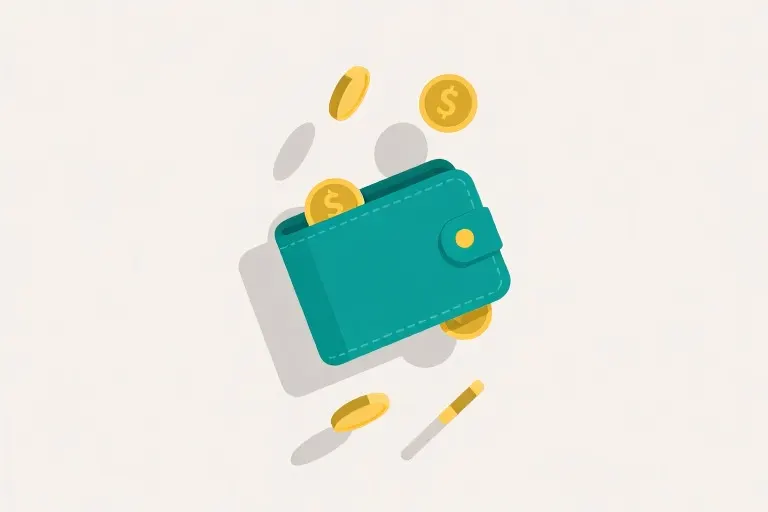The clock strikes 3 AM. You’re wide awake again, staring at the ceiling with that familiar knot of anxiety tightening in your stomach. Bills. Rent. That unexpected car repair. The numbers keep scrolling behind your eyelids like a relentless ticker tape of dread.
Here’s the uncomfortable truth: Your money problems aren’t about money at all. They’re about the faulty operating system running in your mind. That scarcity mindset whispering “there’s never enough”? It’s malware corrupting your financial decision-making. Those guilt pangs when you spend on something enjoyable? Outdated programming from childhood.
Consider this your intervention. Over the next few minutes, we’ll debug your money mindset together. You’ll discover how financial freedom begins not with a bigger paycheck, but with rewriting the subconscious scripts controlling your relationship with wealth. This isn’t another budgeting lecture – it’s a psychological upgrade for your wallet and your wellbeing.
Recent studies from Princeton University reveal something fascinating: People making $75,000 experience similar day-to-day happiness as those earning millions. Yet surveys show 60% of Americans lose sleep over finances regardless of income level. The disconnect? Money anxiety stems from perception, not account balances.
You’ve been solving the wrong equation. Chasing more dollars while carrying mental baggage that leaks abundance like a sieve. Let’s fix that.
By the time we’re done, you’ll have:
- Identified your personal “money viruses” (those sneaky beliefs sabotaging your prosperity)
- Installed an abundance framework that transforms how you see opportunities
- Gained clarity on whether you’re building a job, career, or calling
- Practical steps to start earning like someone who believes they deserve wealth
This isn’t hypothetical. Last month, a graphic designer client implemented just the mindset shifts we’ll cover here. She stopped underselling her services, raised rates by 40%, and landed two dream clients – all before changing her portfolio. The money was always available. She just needed the mental permission slips to claim it.
Your turn. Let’s begin the reprogramming.
The Truth About Money Problems: It’s All a Psychological Game
That knot in your stomach when bills arrive. The sleepless nights calculating expenses. The constant background anxiety whispering “there’s never enough.” These aren’t signs of financial failure – they’re symptoms of a mental virus called scarcity mindset that’s running your money decisions on autopilot.
How Scarcity Traps You in a Poverty Loop
Scarcity mentality isn’t about actual lack; it’s a perceptual distortion that:
- Shrinks your mental bandwidth by 13 IQ points (Harvard research)
- Forces tunnel vision on immediate costs rather than long-term gains
- Creates self-fulfilling prophecies through panic-driven decisions
Real-life example: Two freelancers earn $5,000/month.
- Scarcity thinker: “Must save every penny” → turns down $2k training → skills stagnate → income plateaus
- Abundance thinker: “Invest to grow” → takes course → lands $8k/month clients within 6 months
The Silent Question You Stopped Asking
Complete this sentence: “If money weren’t an issue, I would _.”
Most can’t answer immediately because scarcity programming:
- Deletes dreaming capacity (“Be realistic!”)
- Equates financial desire with greed
- Prioritizes survival over creation
Self-audit: Track how often these scarcity phrases appear in your thoughts:
- “I can’t afford…” (vs “How could I afford…?”)
- “Money doesn’t grow on trees”
- “Rich people are lucky/crooked”
Rewiring Exercise: Mental Time Travel
- Recall a recent money stressor (e.g., rent payment)
- Imagine your future self 5 years from now looking back:
- What tiny action could past-you have taken to prevent this?
- What advice would future-you give about handling it?
This creates psychological distance to escape scarcity’s grip.
Your Brain’s Hidden Wealth Switch
Neuroscience reveals our “financial thermostat” gets set by:
- Childhood observations (how parents discussed money)
- Cultural narratives (“starving artist” tropes)
- Personal defining moments (that “broke college student” identity)
The good news? Like adjusting a physical thermostat, you can reprogram yours through:
Daily mental stretches:
- Morning: Visualize money flowing to you effortlessly
- Evening: List 3 existing abundances (skills, relationships, opportunities)
Breaking the Illusion
Scarcity feels real, but it’s just mental software running outdated code. The moment you recognize:
- Money problems = thought habits
- Financial limits = self-imposed beliefs
you gain the power to change them. Not by magically manifesting wealth, but by upgrading how your brain processes financial reality.
Next step: Keep a 24-hour “scarcity spotting” journal. Each time you hear that lack-mentality voice, note:
- Trigger (what happened)
- Physical sensation (where you feel it)
- Alternative thought (what abundance thinking would say)
This builds metacognition – your secret weapon against money anxiety.
Where Your Money Programming Really Comes From
You didn’t invent your relationship with money – it was installed in you like preloaded software. By age 7, most of us have already absorbed our core financial beliefs from five primary sources that continue running in the background of every money decision we make.
The 5 Toxic Money Scripts You Inherited
- The Scarcity Mantra (From Parents)
- “Money doesn’t grow on trees”
- “We can’t afford that”
- These phrases wire your brain for lack rather than abundance. Research from Cambridge University shows children who frequently heard scarcity language develop heightened financial anxiety that persists into adulthood.
- The Puritan Paradox (From School/Religion)
- “Money corrupts”
- “Rich people are greedy”
- This creates subconscious guilt around wealth. Notice how schools teach trigonometry but never compound interest? That’s not an accident.
- The Lottery Mindset (From Media)
- Overnight success stories
- “Get rich quick” headlines
- These narratives make wealth seem random rather than skill-based. Social media exacerbates this with curated displays of luxury without context.
- The Worker Bee Doctrine (From Corporate Culture)
- “Be grateful for your paycheck”
- “Don’t rock the boat”
- This keeps people trapped in the job (not career or calling) mentality we’ll explore later.
- The Taboo Tradition (From Society)
- Not discussing salaries
- Considering money “private”
- Silence breeds ignorance. In countries where pay transparency is mandated (like Norway), the gender pay gap shrinks by 20%.
Case Study: Same Income, Different Financial Destiny
Meet Sarah and Emily, both 32-year-old graphic designers earning $75,000/year:
| Factor | Sarah (Struggling) | Emily (Thriving) |
|---|---|---|
| Childhood Money Messages | “Rich people exploit workers” (parents were union organizers) | “Money helps us help others” (parents ran nonprofit) |
| Education | State college, no financial courses | Took “Psychology of Money” elective |
| Media Consumption | Only follows “hustle culture” influencers | Reads biographies of self-made entrepreneurs |
| Money Conversations | Never discusses finances with friends | Hosts monthly “Money Mastermind” dinners |
| Current Financial State | $15k credit card debt, lives paycheck-to-paycheck | $50k invested, taking 3-month sabbatical |
Their divergence proves psychologist Brad Klontz’s finding: Your money scripts predict financial outcomes better than IQ or education.
Rewriting Your Financial Operating System
Here’s your 3-step debug process:
- Identify the Buggy Code
- Complete this sentence: “In my family, money meant __“
- Recall your earliest money memory – what emotion surfaces?
- Run a System Scan
- When you check your bank balance, do you feel dread (scarcity) or curiosity (abundance)?
- Do you avoid negotiating salaries? That’s Puritan programming.
- Install New Commands
- For every toxic script, create an antidote affirmation:
- Old: “Money corrupts” → New: “Money amplifies my values”
- Old: “We can’t afford” → New: “We choose to prioritize differently”
Your 24-Hour Reprogramming Challenge
- Text a friend: “What’s one money belief you got from your parents?” (Breaking the taboo)
- Unfollow 3 “get rich quick” social accounts, follow 1 evidence-based financial educator
- Write your money autobiography in 300 words – when did you first feel rich/poor?
“You can’t change the software until you acknowledge it’s running.” – Next week, we’ll explore how to turn this new awareness into income-generating skills.
Keyword Integration: Money mindset, financial anxiety, scarcity mentality, wealth psychology, toxic money beliefs
Making Money Is a Skill, Not a Lottery Ticket
Let’s shatter one of the most damaging money myths right now: the belief that financial success is about luck, connections, or some magical ‘money gene’. The uncomfortable truth? You’ve probably been using this myth as an excuse without realizing it.
The Three-Stage Skill Acquisition Model
Every money-making ability follows the same predictable progression:
- Conscious Incompetence (The Awkward Phase)
- You recognize the skill exists but can’t execute it
- Example: Your first freelance project where you undercharge by 80%
- Psychological hurdle: Imposter syndrome screams “You’re not ready!”
- Conscious Competence (The Grind Phase)
- You can perform the skill with focused effort
- Example: Systematically raising rates after each client success
- Key behavior: Creating checklists and processes (e.g., sales scripts)
- Unconscious Competence (The Flow Phase)
- The skill becomes second nature, like riding a bike
- Example: Closing high-ticket clients without sales anxiety
- Hallmark: Your income becomes predictable and scalable
Case Study: From $10 to $100/Hour
Meet Sarah, a former administrative assistant who transformed her life through skill stacking:
- Month 1-3 (Conscious Incompetence)
- Learned basic copywriting through free resources
- Landed first $10/hour gig rewriting product descriptions
- Made every rookie mistake (missed deadlines, weak revisions)
- Month 4-9 (Conscious Competence)
- Specialized in email sequences for e-commerce
- Created portfolio showcasing 37% conversion lifts
- Systematically raised rates to $50/hour
- Month 10+ (Unconscious Competence)
- Developed signature “3-Email Sales Booster” package
- Charged $2,500/project (equivalent to $100+/hour)
- Clients came through referrals without pitching
The Skill Selection Matrix
Not all skills are created equal. Prioritize abilities with:
| Trait | Examples | Income Multiplier |
|---|---|---|
| Scalable | Coding, Writing, Consulting | 10x+ |
| Quantifiable Value | Sales, Marketing | 5-8x |
| Automation Potential | Funnel Design, AI Tools | 3-5x |
Your 72-Hour Skill Jumpstart
- Tonight: Audit your existing skills (even “unsexy” ones like organizing)
- Tomorrow Morning: Research one scalable skill adjacent to your strengths
- 48 Hours From Now: Complete a micro-project (e.g., rewrite a website headline)
Remember: Every expert was once a beginner who refused to quit. Your current financial situation isn’t a life sentence—it’s just feedback showing where to focus your skill development.
Job, Career, Calling: Diagnosing Your Income Blueprint
We’ve all heard the saying “Do what you love and you’ll never work a day in your life.” But here’s what nobody tells you – there are three fundamentally different ways to monetize your time, and choosing the right path makes all the difference between financial struggle and abundance.
The Three Income Architectures
- Job: The Transactional Exchange
- Definition: Trading time for money at a fixed rate
- Pros: Predictable income, clear boundaries
- Cons: Income ceiling directly tied to hours worked
- Mindset: “I need to work to make money”
- Example: Hourly wage jobs, most 9-to-5 positions
- Career: The Value Ladder
- Definition: Building specialized skills that command higher compensation
- Pros: Scalable income through skill mastery
- Cons: Requires continuous learning and adaptation
- Mindset: “I grow my value to increase earnings”
- Example: Consultants, specialized professionals
- Calling: The Passion Monetization
- Definition: Aligning work with personal purpose and strengths
- Pros: Intrinsic motivation, highest income potential
- Cons: Requires entrepreneurial thinking
- Mindset: “I create value from who I am”
- Example: Creators, entrepreneurs, thought leaders
The Upgrade Path
Most people get stuck at the Job level because they never consciously choose their income architecture. Here’s how to diagnose your current position:
Self-Assessment Questions:
- Do you get paid for time (Job), results (Career), or unique value (Calling)?
- Could someone else easily replace you in your current income stream?
- Does your work energize you or drain you?
The Transition Framework:
- From Job to Career
- Identify transferable skills
- Build specialized knowledge (certifications, niche expertise)
- Shift from hourly billing to value-based pricing
- From Career to Calling
- Audit your natural strengths and passions
- Develop personal brand and audience
- Create products/services that leverage your unique perspective
Case Study: The Graphic Designer Evolution
- Job Stage: $25/hour freelance designer on Upwork
- Career Stage: $150/hour branding specialist for startups
- Calling Stage: $10,000/month online course teaching designers how to find their unique style
Your 24-Hour Challenge
- Map your current income streams to the three categories
- Identify one skill you could develop to move one level up
- Research three people who’ve successfully made the transition you’re considering
Remember: Your income level isn’t fixed – it’s simply a reflection of which architecture you’ve chosen to operate within. Tomorrow we’ll dive into specific strategies for monetizing your calling, but today’s awareness is the crucial first step.
“You don’t get paid for the hour. You get paid for the value you bring to the hour.” – Jim Rohn
24-Hour Launch Plan: Rewire Your Money Mindset Starting Today
You’ve just absorbed a fundamental truth: money struggles are mindset struggles. Now comes the moment where knowledge transforms into power – your 24-hour reprogramming challenge. This isn’t about vague inspiration; it’s your concrete playbook for immediate action.
Step 1: Decode Your Money Triggers (Morning Routine)
Before your first coffee, grab your phone or notebook and:
- Record your latest money anxiety episode
- When did it happen? (e.g., “Last Thursday when rent auto-debited”)
- What physical sensations accompanied it? (Tight chest? Rapid breathing?)
- What catastrophic thought emerged? (“I’ll never get ahead”)
- Trace its origin
- Which childhood money script does this echo? (e.g., Dad saying “Money doesn’t grow on trees”)
- How might someone with an abundance mindset interpret this same situation?
Pro Tip: Set phone reminders for 3 random check-ins today to catch subconscious money thoughts.
Step 2: Fire Your Limiting Beliefs (Lunch Break Exercise)
Open a fresh document and write:
“Effective immediately, I terminate my agreement with these outdated money beliefs:”
- List 3 toxic financial narratives you’ve carried (e.g., “Rich people are greedy”)
- For each, draft a replacement belief (e.g., “Wealth enables generosity”)
- Sign and date this “termination letter” – yes, this ceremonial act matters neurologically
Step 3: Skill Scouting Expedition (Evening Deep Dive)
Research one income skill that aligns with:
- Your natural strengths (e.g., verbal/visual/logical)
- Market demand (Check Upwork/Indeed for “high demand + low competition” niches)
- Earning potential (Aim for skills with $50+/hour benchmarks)
Actionable Framework:
- Identify 3 potential skills (e.g., UX writing, data visualization)
- For each, find:
- Free learning resource (YouTube course? Blog tutorial?)
- Entry-level project idea (Redesign a local business’ menu?)
- Earning case study (“How Jane made $3k/month within 90 days”)
The Momentum Maker
Before bed, complete this sentence in your notes app:
“Today I discovered that my money story is really about . Tomorrow, I’ll take one small step toward skill by __.”
Coming Next: The unspoken rules of monetizing your passions – including why “do what you love” is incomplete advice and how to spot profitable interests versus expensive hobbies. You’ll receive:
- The Interest Profitability Index (our proprietary evaluation tool)
- 5 passion-to-income pathways rarely discussed
- How to avoid the “monetization guilt trap”
Remember: Knowledge unapplied is just entertainment. Your future self will thank today’s decisive version of you.
The 24-Hour Launch Plan
You’ve just absorbed a complete mental upgrade about money. Now comes the moment that separates dreamers from doers – your first action. Consider this: every profound financial transformation began with a single intentional step. Today, that step is yours to take.
Your Immediate Action Blueprint
- Capture Your Money Trigger
- Before bedtime, identify one situation today where financial anxiety surfaced. Was it checking your bank balance? A friend’s vacation photos? Document the exact moment and your emotional response (fear, envy, resignation). This awareness disrupts autopilot scarcity reactions.
- Write a Termination Letter to Limiting Beliefs
- Take out any notebook and address it to your most persistent negative money thought (e.g., “Dear ‘Rich People Are Greedy’ belief”). State clearly why this mindset no longer serves you, then literally tear it up. The physical act reinforces psychological change.
- Skill Exploration Sprint
- Spend 30 minutes researching one income skill that intrigues you. Look for:
- Real-world earning examples (Upwork freelancer profiles, industry salary reports)
- Beginner learning paths (free Coursera modules, YouTube tutorials)
- Communities where practitioners gather (subreddits, Facebook groups)
Why This Works
Neuroscience shows that new neural pathways form fastest when:
- Immediate application follows learning (within 24 hours)
- Emotional engagement accompanies the action
- Small wins build confidence
This plan leverages all three principles. You’re not just consuming information – you’re reprogramming through experience.
Your Bonus Toolkit
Download our [Money Mindset Reset Checklist] featuring:
- A 7-day spending emotion tracker
- Scripts for negotiating higher rates
- “Abundance triggers” to place in your environment
What Comes Next?
In our next session, you’ll discover:
- The hidden “interest monetization matrix” successful creators use
- How to identify which of your hobbies have profit potential
- Case studies of passion projects generating $5K+/month
Remember: Knowledge only becomes power when applied. As you close this page, decide right now – will today be another “someday” in your financial story, or the first page of your abundance chapter? The cursor is blinking. Your move.





